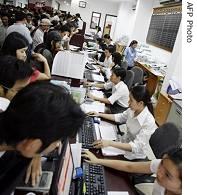2007年VOA标准英语-Vietnam's Stock Market Roars Skyward(在线收听)
Hanoi
17 January 2007
The Ho Chi Minh City stock exchange has been chalking up extraordinary numbers. The VNIndex is up about 31 percent since the start of this year. The market's enthusiasm reflects Vietnam's strong economy, but some experts have warned of "irrational exuberance". In Hanoi, Matt Steinglass has more.
Vietnam's stock market had a spectacular year in 2006, with the main index up 144 percent to close at 751 points at year's end. In the new year, it has only gotten stronger. The VNIndex topped 800 on January 5, and 900 on January 12. This week, it has neared 1,000.

Investors crowd Saigon Securities Incorporation (SSI)'s trading floor in Ho Chi Minh City
At the Bao Viet Securities Company in Hanoi, which trades shares listed on the Ho Chi Minh City exchange, trader Tran Sy Tiep says he has never been so busy.
Tiep says the traders have no free time at all lately. He says they get home from work at midnight every night.
The rising index partly reflects the strength of Vietnam's economy, which grew eight percent last year. The country joined the World Trade Organization on January 11, signaling that its export-driven economy should continue to grow.
Dominic Scriven is the managing director of Dragon Capital, which manages over a billion dollars in Vietnamese assets and securities. Scriven says Vietnam's growing economy is awash with cash.
"So liquidity needs to find a home. And given that the real estate market is not quite as active as some people had hoped it might be, it's easy to see that liquidity can flow into markets for other assets, like financial assets," said Scriven.
But many observers feel the economy's fundamentals cannot account for the extraordinary rise. Vietnam's stock market is still small, with just 106 companies listed. Some stocks are already trading at price-to-earnings ratios of 30 to one. That means the price of one share is more than 30 times the company's earnings per share. In most markets, ratios over 20 are considered high and a sign that a market is nearing its top.
In a report issued in mid-December, the International Monetary Fund's Hanoi office cautioned investors against what it called "irrational exuberance". At the time, the VNIndex stood in the mid-700s. It has risen over 200 points since.
The governor of Vietnam's State Bank has warned that the prices of some shares involved "illusory factors." He said that many Vietnamese companies release misleading financial statements.
"Yes, there is a kind of element of overexcitement, in a way going beyond the capacity of the market, going beyond the capacity of the regulatory authority at this moment. The market development is too fast, in a way," said Noritaka Akematsu, the lead financial economist at the World Bank's office in Hanoi.
Noritaka says the exchange's infrastructure has improved, but is still inadequate to handle the volume of trading. He says the Vietnamese authorities cannot ensure that companies report their earnings accurately, or that trades are properly settled. Investors, he says, should be careful.
"With inadequate transparency, it is difficult to do fundamental analysis," he said. "I hope they will invest more on the fundamentals of individual stocks, rather than just going like a casino, or a game."
Some of the exuberance has seen in other parts of Asia, where exports have driven economic growth higher. Most of the region's stock markets rose sharply last year. In China, where economic growth was more than 10 percent, Shanghai's main stock index more than doubled last year. Mumbai's index was up more than 50 percent, as the economy expanded by more than eight percent.
Dragon Capital's Scriven says while the risks are real, they are inevitable in a young market like Vietnam's.
"I think anybody who follows this equity market has got to raise their eyebrows slightly at the level of activity. Equally, I have a suspicion that it's possibly not that easy to avoid, because there are sort of growing pains, and you need to have bull markets [rising markets] and you need to have bear markets [falling markets]," he said.
At the moment, the Vietnamese market is as bullish as a bull market can be.